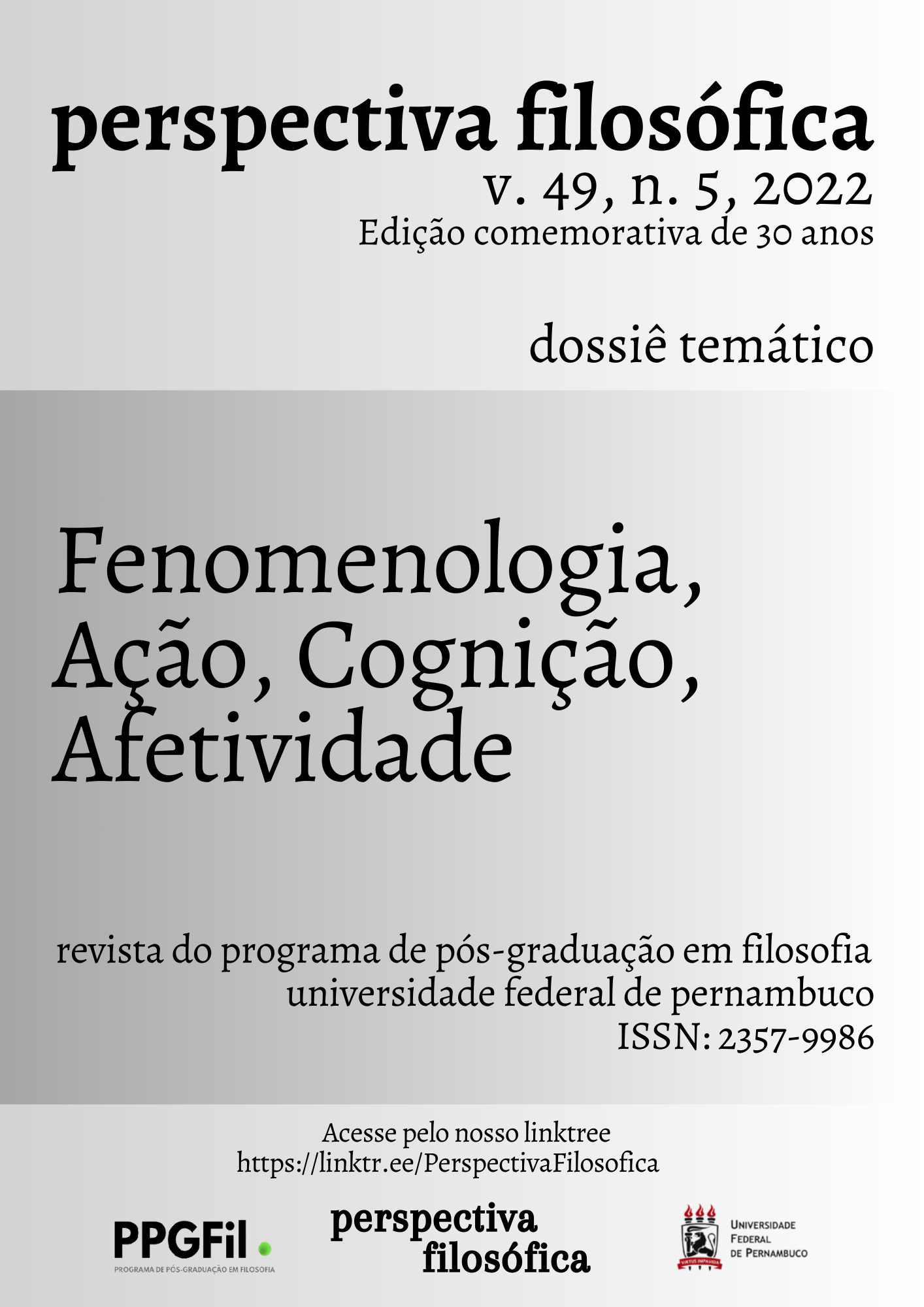Enativismo e Psicologia Moral: Aprendendo (Juntos) a Ser Gente
DOI:
https://doi.org/10.51359/2357-9986.2022.256761Palavras-chave:
enativismo, psicologia moral, hábitos, tornar-se humano, dimensão ética da experiênciaResumo
No presente artigo apresento a perspectiva enativa e uma revisão da literatura que visa prover contribuições ao pensamento ético. Mostro como na perspectiva enativa subjaz uma psicologia moral contrária a perspectivas morais universalistas. Por psicologia moral entendo uma compreensão robusta da mente humana, seu desenvolvimento e o que ela é, na medida em que tal compreensão é relevante à vida moral. Por perspectivas morais universalistas, quero me referir a teorias que consideram questões morais como fundamentalmente acerca de escolhas morais, e portanto, que a filosofia moral deve se orientar em torno de uma discussão acerca de quais princípios devem (universalmente) guiar as ações escolhidas. Após apresentar a imagem enativa da psicologia moral humana, veremos que ela precisa ser suplementada por uma proposta do que constitui a dimensão ética da experiência.
Referências
Barandiaran, Xabier E., e Ezequiel A. Di Paolo. 2014. “A genealogical map of the concept of habit”. Frontiers in Human Neuroscience 8: 522. https://doi.org/10.3389/fnhum.2014.00522.
Colombetti, Giovanna, e Steve Torrance. 2009. “Emotion and Ethics: An Inter-(En)Active Approach”. Phenomenology and the Cognitive Sciences 8 (4): 505–26. https://doi.org/10.1007/s11097-009-9137-3.
De Jaegher, Hanne. 2019. “Loving and Knowing: Reflections for an Engaged Epistemology”. Phenomenology and the Cognitive Sciences, agosto. https://doi.org/10.1007/s11097-019-09634-5.
De Jaegher, Hanne, e Ezequiel Di Paolo. 2007. “Participatory Sense-Making: An Enactive Approach to Social Cognition”. Phenomenology and the Cognitive Sciences 6 (4): 485–507. https://doi.org/10.1007/s11097-007-9076-9.
De Jaegher, Hanne, Ezequiel Di Paolo, e Shaun Gallagher. 2010. “Can Social Interaction Constitute Social Cognition?” Trends in Cognitive Sciences 14 (10): 441–47. https://doi.org/10.1016/j.tics.2010.06.009.
Di Paolo, Ezequiel A. 2020. “Enactive Becoming”. Phenomenology and the Cognitive Sciences, janeiro. https://doi.org/10.1007/s11097-019-09654-1.
Di Paolo, Ezequiel A., Thomas Buhrmann, e Xabier E. Barandiaran. 2017. Sensorimotor life: an enactive proposal. First edition. Oxford, United Kingdom: Oxford University Press.
Di Paolo, Ezequiel A., Elena Clare Cuffari, e Hanne De Jaegher. 2018. Linguistic Bodies: The Continuity between Life and Language. Cambridge, Massachusetts: The MIT Press.
Di Paolo, Ezequiel A., e Hanne De Jaegher. 2021. “Enactive Ethics: Difference Becoming Participation”. Topoi, outubro. https://doi.org/10.1007/s11245-021-09766-x.
Diamond, Cora. 2019. “Iris Murdoch’s Picture of the Soul”. Opinion. ABC Religion & Ethics. Australian Broadcasting Corporation. 17 de julho de 2019. https://www.abc.net.au/religion/cora-diamond-picture-of-the-soul-the-moral-psychology-of-iris-m/11316086.
Figueiredo, Nara M. 2021. “On the Notion of Dialectics in the Linguistic Bodies Theory”. Filosofia Unisinos 22 (1): 108–16. https://doi.org/10.4013/fsu.2021.221.13.
Godfrey-Smith, Peter. 2020. Metazoa: Animal Life and the Birth of the Mind. Farrar, Straus and Giroux.
Huffermann, J. D. (2019). “Variedades do Enativismo: Propostas radicais e cognição superior”. Revista Perspectiva Filosófica - ISSN: 2357-9986, 46(2), Article 2. https://doi.org/10.51359/2357-9986.2019.248072.
Huffermann, J. D., & Noguez, P. M. R. (2020). Propostas Enativas e a questão da continuidade entre formas de cognição. Prometheus - Journal of Philosophy, 33, Article 33. https://doi.org/10.52052/issn.2176-5960.pro.v12i33.13814.
Husserl, Edmmund. 1952. Ideen zu einer Reinen Phänomenologie Und Phänomenologischen Philosophie II. Nijhoff: Den Haag.
Hutto, Daniel D., e Erik Myin. 2013. Radicalizing Enactivism: Basic Minds without Content. Cambridge, Mass: MIT Press.
Hutto, Daniel D., e Erik Myin. 2017. Evolving Enactivism: Basic Minds Meet Content. Cambridge, Massachusetts: MIT Press.
Johnson, Mark. 2014. Morality for Humans: Ethical Understanding from the Perspective of Cognitive Science. University of Chicago Press. https://doi.org/10.7208/chicago/9780226113548.001.0001.
Laland, K. N., Odling-Smee, J., & Feldman, M. W. (2000). “Niche construction, biological evolution, and cultural change”. Behavioral and Brain Sciences, 23(1), 131–146. https://doi.org/10.1017/S0140525X00002417.
Maclaren, Kym. 2002. “Intercorporeality, Intersubjectivity and the problem of ‘letting others be’.” Chiasmi International: Trilingual Studies Concerning Merleau-Ponty’s Thought 4: 187–210.
Murdoch, Iris. 2013. The Sovereignty of Good. 2° ed. First Published in 1970. New York: Routledge, Taylor & Francis Group.
Raimondi, V. (2021). “Autopoiesis and evolution: The role of organisms in natural drift”. Adaptive Behavior, 10597123211030694. https://doi.org/10.1177/10597123211030694.
Reis, C. R. M. dos, & Araújo, L. A. L. (2019). “A natureza das mudanças na biologia evolutiva contemporânea: Síntese Evolutiva Estendida?” Revista Dissertatio de Filosofia, 50(0), 133–150. https://doi.org/10.15210/dissertatio.v50i0.14566.
Rolla, G. (2021). A Mente Enativa. Porto Alegre: Editora Fi https://doi.org/10.22350/9786559173341.
Rolla, G., & Figueiredo, N. (2021). “Bringing forth a world, literally”. Phenomenology and the Cognitive Sciences. https://doi.org/10.1007/s11097-021-09760-z.
Rolla, G., & Huffermann, J. (2021). “Converging enactivisms: Radical enactivism meets linguistic bodies”. Adaptive Behavior, 105971232110207. https://doi.org/10.1177/10597123211020782.
Taylor, Charles. 1986. Sources of the Self: The Making of the Modern Identity. Cambridge: Harvard University Press.
Thompson, Evan. 2004. “Life and Mind: From Autopoiesis to Neurophenomenology. A Tribute to Francisco Varela”. Phenomenology and the Cognitive Sciences 3 (4): 381–98. https://doi.org/10.1023/B:PHEN.0000048936.73339.dd.
Thompson, Evan. 2007. Mind in Life: Biology, Phenomenology, and the Sciences of Mind. Cambridge, Mass: Belknap Press of Harvard University Press.
Thompson, Evan, e Francisco J. Varela. 2001. “Radical Embodiment: Neural Dynamics and Consciousness”. Trends in Cognitive Sciences 5 (10): 418–25. https://doi.org/10.1016/s1364-6613(00)01750-2.
Tomasello, Michael. 2014. A Natural History of Human Thinking. Cambridge, Massachusetts. London, England: Harvard University Press.
Urban, Petr. 2014. “Toward an Expansion of an Enactive Ethics with the Help of Care Ethics”. Frontiers in Psychology 5 (novembro). https://doi.org/10.3389/fpsyg.2014.01354.
Varela, Francisco J. 1999. Ethical Know-How: Action, Wisdom, and Cognition. Stanford, California: Stanford University Press.
Varela, Francisco J, Evan Thompson, e Eleanor Rosch. 1991. “Embodied Mind. Cognitive Science and Human Experience”, 328.
Ward, Dave, David Silverman, e Mario Villalobos. 2017. “Introduction: The Varieties of Enactivism”. Topoi 36 (3): 365–75. https://doi.org/10.1007/s11245-017-9484-6.
Werner, K. (2020). “Enactment and construction of the cognitive niche: Toward an ontology of the mind-world connection”. Synthese, 197(3), 1313–1341. https://doi.org/10.1007/s11229-018-1756-1.
Downloads
Publicado
Edição
Seção
Licença
A Revista Perspectiva Filosófica orienta seus procedimentos de gestão de artigos conforme as diretrizes básicas formuladas pelo Conselho Nacional de Desenvolvimento Científico e Tecnológico (CNPq). http://www.cnpq.br/web/guest/diretrizesAutores que publicam nesta revista concordam com os seguintes termos:
Os autores mantém os direitos autorais e concedem à revista o direito de primeira publicação, sendo o trabalho simultaneamente licenciado sob https://creativecommons.org/licenses/by/4.0/deed.pt_BR que permite o compartilhamento do trabalho com reconhecimento da autoria e publicação inicial nesta revista.
Os autores têm autorização para assumir contratos adicionais separadamente, para distribuição não-exclusiva da versão do trabalho publicada nesta revista, com reconhecimento de autoria e publicação inicial nesta revista (Consultar http://opcit.eprints.org/oacitation-biblio.html).

Esta revista está licenciada com uma Licença Creative Commons Atribuição 4.0 Internacional.













